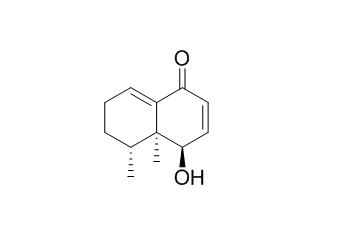Desoxo-narchinol A
Desoxo-narchinol A exhibits protective effects against LPS-induced endotoxin shock and inflammation through p38 deactivation, it shows inhibitory activity against LPS-induced NO production.
Desoxo-narchinol A shows cytotoxic activity against P-388 cells.
Inquire / Order:
manager@chemfaces.com
Technical Inquiries:
service@chemfaces.com
Tel:
+86-27-84237783
Fax:
+86-27-84254680
Address:
1 Building, No. 83, CheCheng Rd., Wuhan Economic and Technological Development Zone, Wuhan, Hubei 430056, PRC
Providing storage is as stated on the product vial and the vial is kept tightly sealed, the product can be stored for up to
24 months(2-8C).
Wherever possible, you should prepare and use solutions on the same day. However, if you need to make up stock solutions in advance, we recommend that you store the solution as aliquots in tightly sealed vials at -20C. Generally, these will be useable for up to two weeks. Before use, and prior to opening the vial we recommend that you allow your product to equilibrate to room temperature for at least 1 hour.
Need more advice on solubility, usage and handling? Please email to: service@chemfaces.com
The packaging of the product may have turned upside down during transportation, resulting in the natural compounds adhering to the neck or cap of the vial. take the vial out of its packaging and gently shake to let the compounds fall to the bottom of the vial. for liquid products, centrifuge at 200-500 RPM to gather the liquid at the bottom of the vial. try to avoid loss or contamination during handling.
Pharmaceuticals (Basel).2022, 15(5):591.
University of Stuttgart2021, 11682.
Pharmaceuticals (Basel).2024, 18(1):19.
Drug Des Devel Ther.2023, 17:2461-2479.
Journal of Functional Foods2022, 99: 105331.
Drug Dev Res.2022, 83(7):1673-1682.
Fitoterapia.2021, 153:104995.
J Sep Sci.2020, 43(22):4148-4161.
FEMS Microbiol Lett.2017, 364(11)
Journal of Ginseng Research2021, 25 November
Related and Featured Products
Bioorg Med Chem Lett. 2012 Jan 1;22(1):706-8.
Inhibitory constituents of Nardostachys chinensis on nitric oxide production in RAW 264.7 macrophages.[Pubmed:
22079762 ]
METHODS AND RESULTS:
The activity-guided fractionation of the MeOH extract of the rhizomes and roots of Nardostachys chinensis led to the isolation of two new sesquiterpenoids, narchinol B (8) and narchinol C (9), along with 10 known compounds, ursolic acid (1), nardosinone (2), pinoresinol (3), Desoxo-narchinol A (4), kanshone B (5), epoxyconiferyl alcohol (6), debilon (7), 4α,5-dimethyl-1,3-dioxo-1,2,3,4,4α,5,6,7-octahydronaphthalene (10), p-coumaric acid (11), and isoferulic acid (12). Their structures were determined using spectroscopic techniques, which included 1D- and 2D-NMR.
CONCLUSIONS:
Among the isolates, compounds 2, 4, 5, 8 and 9 showed inhibitory activity against LPS-induced NO production with IC(50) values of 4.6-21.6 μM.
Int Immunopharmacol. 2015 Dec;29(2):730-738.
Anti-inflammatory effect of desoxo-narchinol-A isolated from Nardostachys jatamansi against lipopolysaccharide.[Pubmed:
26371857]
We previously reported that Nardostachys jatamansi (NJ) exhibits anti-inflammatory activity against lipopolysaccharide (LPS). However, the active compound in NJ is unknown.
METHODS AND RESULTS:
Therefore, here, we examined the effects of Desoxo-narchinol A (DN) isolated from NJ against LPS-induced inflammation. To demonstrate the anti-inflammatory effect of DN against LPS, we used two models; murine endotoxin shock model for in vivo model, and peritoneal macrophage responses for in vitro. In endotoxin shock model, DN was administrated intraperitoneally 1h before LPS challenge, then we evaluated mice survival rates and organ damages. Pretreatment with DN (0.05mg/kg, 0.1mg/kg, or 0.5mg/kg) dramatically reduced mortality in a murine LPS-induced endotoxin shock model. Furthermore, DN inhibited tissue injury and production of pro-inflammatory cytokines, such as interleukin (IL)-1β, IL-6, and tumor necrosis factor alpha (TNF-α), in the liver and lung. In in vitro macrophage model, we examined the inflammatory mediators and regulatory mechanisms such as mitogen-activated protein kinases (MAPKs) and nuclear factor kappa B (NF-κB). DN inhibited the production of inflammatory mediators, such as inducible nitric oxide synthase (iNOS) and its derivative nitric oxide (NO), cyclooxygenase-2 (COX-2), prostaglandin E2 (PGE2), IL-1β, IL-6 and TNF-α and H3 protein acetylation in murine peritoneal macrophages. DN also inhibited p38 activation, but not extracellular signal-regulated kinase (ERK), c-jun NH2-terminal kinase (JNK), and NF-κB.
CONCLUSIONS:
These results suggest that DN from NJ exhibits protective effects against LPS-induced endotoxin shock and inflammation through p38 deactivation.
Chem Pharm Bull (Tokyo). 1993 Jun;41(6):1183-4.
Cytotoxic sesquiterpenes from Nardostachys chinensis.[Pubmed:
8370115]
METHODS AND RESULTS:
Five cytostatic sesquiterpenes, Desoxo-narchinol A (1), nardosinone (2), debilon (3), nardosinonediol (4) and kanshone A (5), were isolated from the roots and rhizomes of Nardostachys chinensis (Valerianaceae). The steric structure of 1 was determined by nuclear Overhauser effects (NOEs) and the exciton chirality method.
CONCLUSIONS:
All five showed cytotoxic activity against P-388 cells and the structure-activity relationship of 1 was also discussed.



